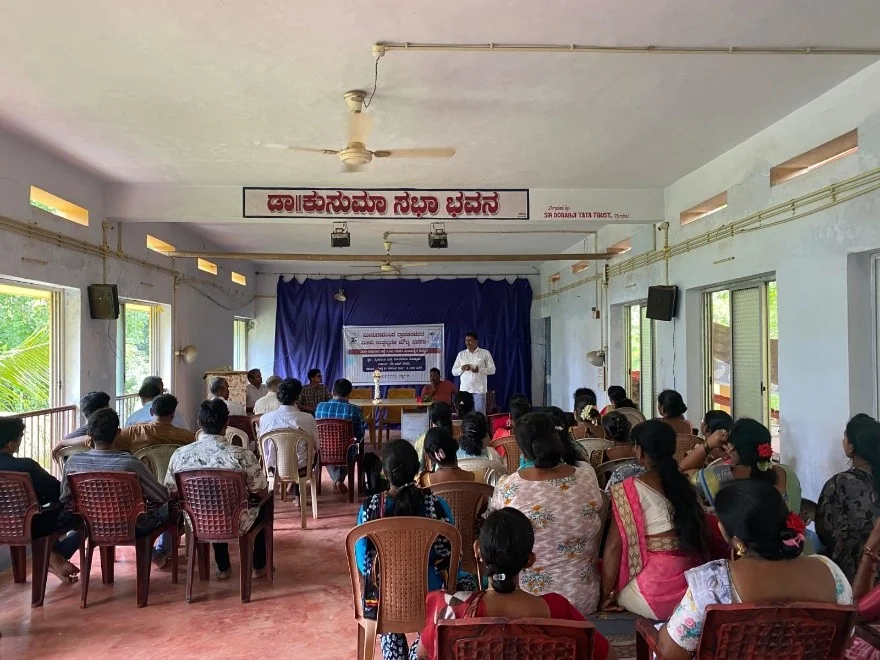On June 9, 2025, a consultative workshop titled “From Fishers to Consumers: Seafood Value Chain” was held at the Snehakunja Trust in Honnavara, Karnataka, with support from the Dried Fish Matters (DFM) project. The gathering brought together about 45 participants, including fishers from all three coastal districts of Karnataka, fisherwomen, government representatives, NGOs, and academics. The workshop was inaugurated by Shri Abhishek Jamalabad of The Habitats Foundation, Mumbai. Shri Umesh Mesta, President, Belakonda Fishers Cooperative Society, Honnavara, was the Chief Guest, and Shri Ganapati Ishwara Tandel, former President, Honnavara Fresh Fish Merchants’ Association, was the Special Guest of the workshop.
The discussions revealed deep anxieties about the decline in fish catches and the continued use of destructive practices such as bull trawling and light fishing. Although officially restricted, weak enforcement has allowed these methods to persist, degrading marine habitats and undermining small-scale fishing livelihoods. Many participants urged that enforcement be taken as seriously as it was during moments of national security, when fishing activities were tightly controlled.
Market changes also figured prominently in the conversations. Traditional fish auctions, once the mainstay of price discovery, are being displaced by forward contracts with large-scale buyers. This shift often leaves fishers, and especially fisherwomen, more vulnerable. Women who purchase fish for resale and for dried fish production face rising costs and dwindling availability. They also find themselves competing with male vendors who now dominate last-mile retailing through motorbikes, three-wheelers, and vans, leaving women’s headload-based sales increasingly unviable.
Dried fish emerged as both a site of challenge and innovation. While fisherwomen welcomed financial support schemes such as the PMFME (Pradhan Mantri Formalization of Micro Food Processing Enterprises) program, many stressed that market access matters more than subsidies. Some shared inspiring examples of self-organized enterprises: a Surathkal group now produces packaged dried fish and shrimp pickle, while others have improvised drying units using locally available materials. The Daarji Muslim community of Honnavara, renowned for distinctive fish drying practices, was also noted for its contribution to higher-quality dried fish production.
Collective organizing was seen as a pathway forward. Twenty fisherwomen from Belakonda described their integration into a Fish Producer Company supported by the Karnataka State Rural Livelihoods Mission, an umbrella that could strengthen access to inputs and markets if managed well. Participants from other districts hoped for similar opportunities in their regions.

At the policy level, the workshop pointed to a mismatch between government programs and the lived needs of traditional fishers. Many schemes remain geared toward capital-intensive modernization, while artisanal fishers struggle for even basic support. Participants called for decentralized, flexible program design that could genuinely reach small-scale producers and prevent funds from being left unused.
Despite concerns that younger generations may be less interested in dried fish production, participants were hopeful that with fair returns, improved hygiene, and better consumer recognition, the tradition could endure. Campaigns to promote dried fish as both nutritious and culturally significant were seen as critical to its future.
The workshop in Honnavara made one message clear: sustainable fisheries in Karnataka depend not only on protecting marine ecosystems, but also on recognizing and supporting the knowledge, labour, and resilience of small-scale fishers, especially women, who remain at the heart of the dried fish value chains.
DFM’s ongoing Phase 2 work in Karnataka is building directly on these issues, with a keen lens on questions of climate risk, human rights, and the availability of good quality fish for human consumption, as well as a focus on economic and other drivers leading to fish diversion to uses such as Fish Meal Fish Oil (FMFO) industry. This work has taken shape under the new project Reimagined Food Systems (RFS). As an outcome of DFM’s Phase 1 work, the RFS project will develop a more focused understanding of small-fish value chains. Through RFS, the project is examining small-fish value chains with a focus on nutrition, climate challenges, human rights, and social justice. This work builds on the insights of DFM’s Phase 1, while also opening pathways for policy action and civil society mobilization.

